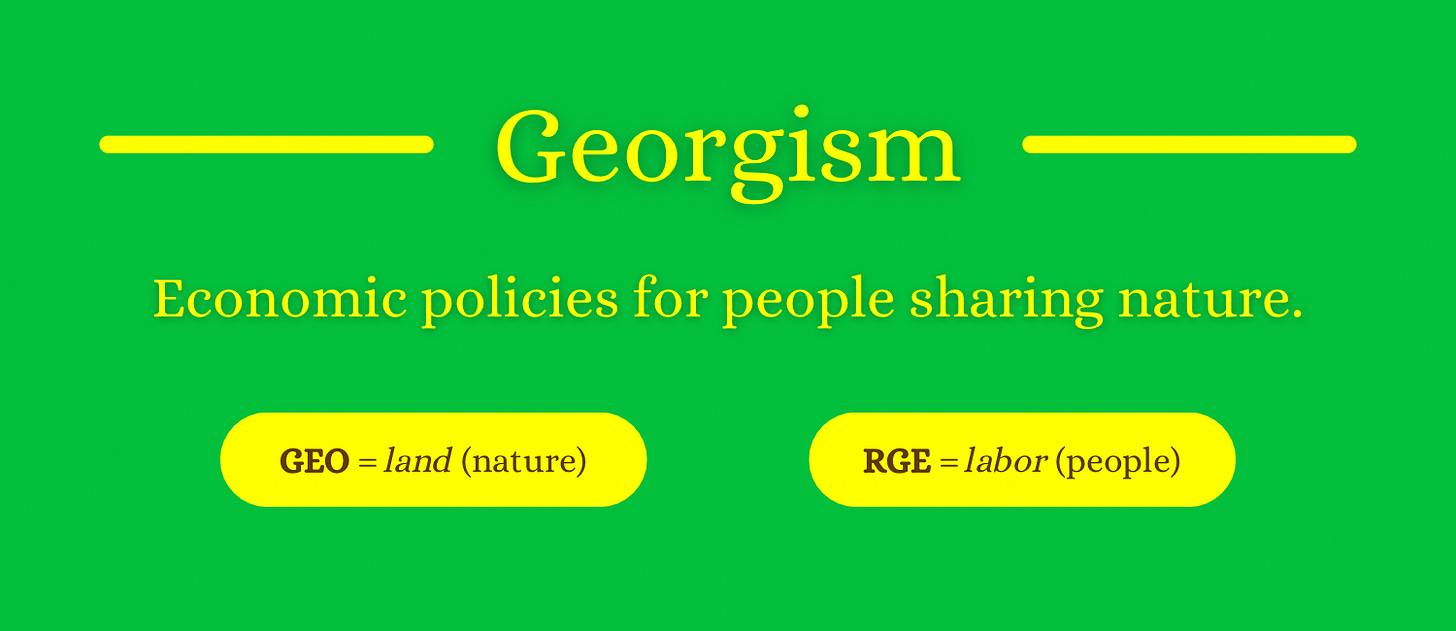[UPDATED 2024-10-05: Removed dead URL.]
I’ve noticed something about how Geoists tend to approach Georgists when they invite Georgists to participate in Geoist fora. I hope they are not offended by my musings here.
On Labels and Unity
The conversation usually starts something like this (paraphrased, not an exact quote):
We have decided to call ourselves Geoists rather than Georgists to leave space for other policy proposals and emphasize natural resources.
Incidentally, if you’ve read my earlier blog post…
… you would know how I feel about the missing “rg” in Geo(rg)ism. I believe labor should be at the center of economic conversations instead of being cut out from them.
If Geoists are supposedly more big-tent-energy/inclusive, to imply that Georgists are too narrow-minded is an odd way to start off any conversation with self-identified Georgists — especially if you’re trying to recruit partcipation from us. I recognize that each new generation of Georgists have (and will have) some subset who briefly think Geoism will catch on better, but I have yet to see it pan out.
The term geoism has been used since the 1980s as a more generic name […]1
Let’s take a look at how things have been going over the last 20 years.

It’s interesting to see how the data from first time period changed with the same query after we added 5 months worth of data. Maybe what Google considers related queries changed over the last 5 months.

Fortunately, Georgists aren’t easily offended — at least the ones I hang out with tend to be pretty easy-going about this sort of thing. (If you’ve been subjected to a bad sample, you have my condolences. I know this happens. More often than I’d like.)
While I wish for all Georgist and Georgist-adjacent projects to succeed, the outlook for centering on nature in the near term without due consideration of the working people seems uncertain to me. For example, I was surprised to learn that not every Georgist thinks that climate change is substantially impacted by humans. What if we (re)created space specifically in our movement for people who cared more about people’s impact on other people instead of relegating people-centric thinkers to the “other policy” category and hoping for the best?
This is not to discourage Earth-rights centered approaches, because we have had some level of success there, particularly when it comes to supporting clean energy (carbon tax, etc.), so there’s still momentum in the zeitgeist to tap into. I’m just offering an alternative thought.
What if we came to see Georgists as more than just the cult-like following of a man who just happened to have been named George? We joke about the cult part quite often — humor seems to be more effective at neutralizing any power which anti-Georgists think they wield with such accusations than reacting indignantly and spending precious energy on putting distance between us and Henry’s insights.
Placing labor back in the center of Georgist discussions seems to have thus far generated strong positive feelings for the Georgist movement in “focus groups” (if we can call the active participants in the Georgism Discord server that 😉).
GEO: Aligning Developers’ Interests with Environmentalists’ Interests
Environmentalism tends to get “weaponized” by certain political groups which seek to delay all development indefinitely through environmental review requirements … save the salmon, save the trees, etc. There’s always something to save and it’s important to consider the trade-offs in any situation. The usage of these review requirements as a filibuster/stall tactic — more than just giving the environment a seat at the table and a voice in the conversation — is abuse of process. As lobbyists throw wrench after wrench into the machinery, working people wander the streets without a place to hang their hats and rest their heads. The Georgist/Pigouvian razor offers a methodological approach to determining (through pitting aggregate negative externalities against aggregate positive externalities) whether the procedural brake checking is warranted or whether such actions are irresponsible, wreckless, and an egregious misallocation of the community’s resources with disproportionately dire consequences for the underprivileged members of the community.

Such filibuster scenarios put the unhoused, under-housed, and mobility/multi-modal infrastructure enthusiasts potentially at odds with their climate change sentiments. I see this increasing over time in the near future, particularly with Gen Zers who will eventually have to come to terms with Greta Thunberg’s rare privilege — to be able to afford to travel safely on the environmental moral high ground. Being a tad older, I’m fortunate enough to not have to grapple with that directly. By the time my kid is old enough to have political opinions, the political tides will have shifted again. We know that Georgism reconciles these opposing sentiments and aligns development interests with environmental interests. Yet those conversations can still be rather strained under the current political almosphere. Maybe you’ve seen this article already:
We can exempt and subsidize conservation efforts, as long as it’s a conscious decision made by a representative body of actively participating members of the community — a proper sampling of those who live, work, and play there.2 We don’t want so many exemptions and subsidies that the original thrust of the policy is rendered impotent and meaningless. The value added to the community (as reflected in ground rents) by the exemption or subsidy must be greater than the value added to the community by full compliance/conformity.
But where is labor during these discussions?
RGE: Working Together — Alliances with Pro-LVT Anti-Georgists
Geoism has, this year, attracted people like Anthony Galli, who is highly critical of Georgists (both on his YouTube channel and in the Georgism subreddit) and kind of aggressive about it. But perhaps in small doses, he can be useful to keep around to keep the rest of us sharp. He actively cites George’s writings, creating opportunities for the rest of us to revisit those sections and provide the fuller quotations and context. My optimistic hope is for Anthony to eventually read enough to more fully understand Georgism, since he is already demonstrating more studiousness in the subject (as driven by his animosity toward it) than many self-proclaimed Georgists (…maybe not unlike an earlier Michael Hudson3). Even if he doesn’t become more amicable toward Georgists, his participation boosts awareness through a controversy effect, so I encourage all Georgists to remain friendly toward him and act professionally. There might be potential Georgists we really want on our side observing how we treat the people we disagree with.
https://www.youtube.com/@AnthonyGalliThis channel has been “terminated.”
It might seem strange for me to promote the works of folks with anti-Georgist leaning tendencies, but we do find common ground in LVT, so even temporary alliances or limited scope partnerships would be mutually beneficial if our working relationships are able to stay cordial. I figure if we extend olive branches which aren’t accepted, we could still potentially attract some positive attention. I don’t see this as a zero-sum situation, nor do I believe that there’s no such thing as bad PR. During potential conflicts, we should endeavor to show that we are calm, cool, collected, and comfortably correct. It should be tough to shake our tree.
By GEORGE! Economic Policies for People Sharing Nature
If we are to win the war (against ignorance and rentierism), per se, we might have to take some risks and lose some battles along the way. Taking the long view, we want to engage politely, present ourselves passionately, and set a strong example of inclusivity. It’s too easy to make mountains of mole hills when we encounter minor disagreements among friends. Georgists have been particularly adept at splintering and veering off into lone-wolf paths. Such uncooperative actions seem contrary to the Georgist philosophy, for in Henry’s words:
Here is the law of progress, which will explain all diversities, all advances, all halts, and retrogressions. Men tend to progress just as they come closer together, and by co-operation with each other increase the mental power that may be devoted to improvement, but just as conflict is provoked, or association develops inequality of condition and power, this tendency to progression is lessened, checked, and finally reversed.4
It turns out that the Georgist movement is NOT exempt from the Law of Progress. Cooperation increases progress while provocation of conflict (and rankism5) lessens, checks, and eventually reverses progress. Where we are able to find common ground and mutual goals, we should work toward them together. But in any case, we should treat each other well. Having firm standards and boundaries doesn’t mean being uncompromising, just as it doesn’t mean compromising at every turn, but it does mean being caring and, when possible, parting without hard feelings wherever we must part.

Georgism, when properly understood (as a philosophy), already meets the big-tent-energy/inclusivity needs and has more historical depth (from my experience), which has encouraged and continues to encourage people to stick with the movement longer-term. It has taken awhile to increase the collective EQ in online Georgist spaces and certainly much more could still be done there (Reddit being a particularly challenging one), but I have been pleasantly surprised to see how far we’ve come. Here’s what I feel is the main tenet of Georgism, in a nutshell:
I propose to beg no question, to shrink from no conclusion, but to follow truth wherever it may lead. Upon us is the responsibility of seeking the law, for in the very heart of our civilization today women faint and little children moan. But what that law may prove to be is not our affair. If the conclusions that we reach run counter to our prejudices, let us not flinch; if they challenge institutions that have long been deemed wise and natural, let us not turn back.6
To me, this means that we start off with George’s writings and amend our conclusions as we find any which may be erroneous, much as George himself did when he corrected his position on patents.7 In understanding how greater knowledge is built upon previous knowledge and how such insights change over time, it’s desirable to leave the door open as egress for errors. What if LVT were not the least bad tax? It would shock me too, and it would be tough to convince me, but the broader goal is still to find the best set of solutions to the problem of poverty amid progress — of the incredible disparity in wealth which continues to grow instead of shrink.
Humans are not infallible. George was not always right. We don’t follow George the person. We each follow our own sensibilities. We only follow George’s sensibilities where he has shown merit in leading. And after that, we continue on under the GEO-RGE banner.
GEO = land (nature)
RGE = labor (people)
We have to have confidence in our own discernment. Overconfidence leads us to act in pigheaded and unattractive ways, but I’ve also seen people’s self-confidence be so low and flimsy as to bend and break as soon as some random anonymous person simply says that so-and-so (Georgist ally) is a “crank”. Or Georgists are all part of a “cult”. Or Georgism is a “pseudoscience” — implying it is somehow moreso than any other economic paradigm or social science. No justification for why they believe this is usually supplied. Just the stigma of potentially being in the out group is enough to shake people’s faith in their own intuitions.
The best way to counteract this weakness is to regularly associate with other Georgists. And we will tend to stick around and make each other stronger if we first make it pleasant to be around each other. Does preserving the peace and allowing healthy relationships to flourish mean we occasionally have to ban someone for acting like an anti-Georgist troll with low EQ and few-if-any redeeming qualities? Yes. Fortunately for the Discord (though less fortunately for the Georgism subReddit), this is a very rare occurrence. The vast majority of us get along swimmingly these days.
Fred Folvary via Frank de Jong https://earthsharing.ca/news/pure-geoism
Adam Ramsay, Trying to Milk a Vulture: If We Want Economic Justice We Need A Democratic Revolution https://www.cooperative-individualism.org/macfarlane-laurie_british-economy-2018.pdf
A simple solution would be to turn the whole palace into a museum and debunk to a city further north. Apart from anything else, Northern England’s rackety trains might finally get the upgrade they have long needed if more MPs were forced to travel on them every week. And if the two chambers were placed in different cities, the narcissism of the place might dissipate a little. At the same time, the various absurd traditions of Westminster should be replaced with clear, accountable democratic procedures, including two proportionally elected chambers with different systems, an element of sortition (which I’ll come to), and mechanisms to ensure women and minority groups are fairly represented.
But ultimately, bringing power closer to people is vital if we are to build a democracy at a more human scale. For too long, local government has been stripped of power, to the point that Britain is now, by some measures, the most centralised developed country. It’s no surprise that people have paid less and less attention to disempowered local authorities with little capacity to shape their communities. But when people are given real decisions, they show up in their thousands.
Muchael Hudson, Henry George's Political Critics
https://onlinelibrary.wiley.com/doi/full/10.1111/j.1536-7150.2007.00560.x
Progress and Poverty, Book 10, Chapter 3
Robert W. Fuller, three related works on rankism and the dignitarian movement:
Somebodies and Nobodies
All Rise
Dignity for All
A movement against rankism is not a movement against power differences. Power differences, and the gradations of rank that mirror them, are in the nature of things, a consequence of variations in native and acquired human capabilities. The movement envisioned here is “dignitarian,” not egalitarian. In our talents and abilities, we are different; in dignity, we are equal.
Henry George, Progress and Poverty, Introductory, final paragraph https://oll.libertyfund.org/titles/george-progress-and-poverty#lf0777_head_005
Progress and Poverty, Book 8, Chapter 3, Section 1
There are among us various sorts of monopolies. For instance, there are the temporary monopolies created by the patent and copyright laws. These it would be extremely unjust and unwise to tax, inasmuch as they are but recognitions of the right of labor to its intangible productions, and constitute a reward held out to invention and authorship.
Footnote
Following the habit of confounding the exclusive right granted by a patent and that granted by a copyright as recognitions of the right of labor to its intangible productions, I in this fell into error which I subsequently acknowledged and corrected in the Standard of June 23, 1888. The two things are not alike, but essentially different. The copyright is not a right to the exclusive use of a fact, an idea, or a combination, which by the natural law of property all are free to use; but only to the labor expended in the thing itself. It does not prevent any one from using for himself the facts, the knowledge, the laws or combinations for a similar production, but only from using the identical form of the particular book or other production—the actual labor which has in short been expended in producing it. It rests therefore upon the natural, moral right of each one to enjoy the products of his own exertion, and involves no interference with the similar right of any one else to do likewise.
The patent, on the other hand, prohibits any one from doing a similar thing, and involves, usually for a specified time, an interference with the equal liberty on which the right of ownership rests. The copyright is therefore in accordance with the moral law—it gives to the man who has expended the intangible labor required to write a particular book or paint a picture security against the copying of that identical thing. The patent is in defiance of this natural right. It prohibits others from doing what has been already attempted. Every one has a moral right to think what I think, or to perceive what I perceive, or to do what I do—no matter whether [h]e gets the hint from me or independently of me. Discovery can give no right of ownership, for whatever is discovered must have been already here to be discovered. If a man make a wheelbarrow, or a book, or a picture, he has a moral right to that particular wheelbarrow, or book, or picture, but no right to ask that others be prevented from making similar things. Such a prohibition, though given for the purpose of stimulating discovery and invention, really in the long run operates as a check upon them.






i'm changing allegiance to Ceorgism